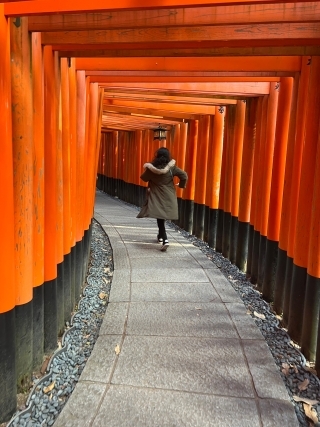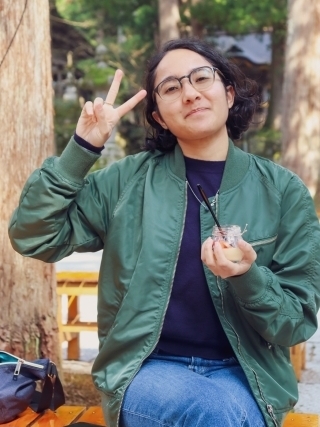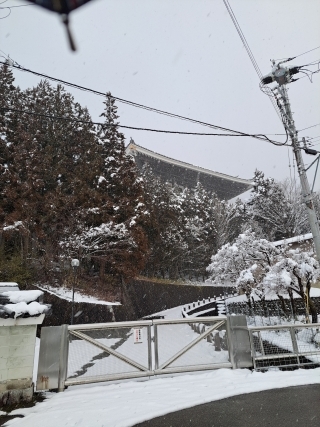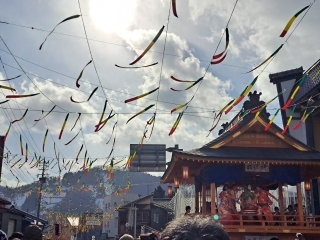JET Programme Series: Settling in a New Landscape - Saeeda Ali
2023/5/25



JET Programme Series: Settling in a New Landscape - Saeeda Ali

This is the longest I’ve been away from home before, and I’m relieved that I’ve made a comfortable home for myself.
A worry I had before leaving Trinidad was that I wouldn’t integrate into my school or the community. Thankfully, that’s not the case. The people are warm, and although I’ve gone to other prefectures, I’m always happy to return home. There are obviously difficulties – some people are taken aback seeing a foreigner, some love my foreignness too much where I’m viewed as a fascinating thing rather than a fellow human, and for some, I know my only point of interest is their idea of my foreignness. It can’t be helped, however, because no matter where I go, I’ll meet people like that, as well as those I want to keep forever. I thought walking into someone’s house unannounced was something I had to leave behind in Trinidad, and I thank God every day that I was wrong. The nice foreigners in my city are blessed to have Japanese parents who do for us as all good parents do. Thanks to them and many other beautiful friends, I’ve been whisked off to different areas and festivals, had amazing food, and learned so much about Japan and certainly a lot of Japanese.
I was lucky to traverse through four prefectures thus far – Gifu, Osaka, Ishikawa, and Kyoto, but Fukui really is the best of them all. I got the very mountains and trees and deadly snow I asked for. Katsuyama City is small and serene, and I’ve been happy to document the places I’ve seen in this prefecture on social media as a Fukui Reporter where I can continue my interest in journalism while teaching.
The students at Katsuyama High School are good kids who love their school and work hard, even if they’re not academic. Teaching in a language they’re not fluent in is taxing on us both, but they have determination. They also have no choice, so I try to make it worthwhile. My favourite time of day is when I can see students in the corridors. The feeling of walking down a long corridor lined with students who happily greet me one after the next honestly makes me feel like a rockstar. I always try to teach them that communicative ability comes first. It’s okay to make mistakes and feel like they ‘can’t English’, but once they keep trying with whatever knowledge they have, they’re succeeding. I’ve found that just remembering their interests and letting them teach me Japanese is an amazing way to increase their foreign language communication comfort. I’m aware that many of them will not need English after they graduate. So, I’m satisfied once they speak to me first, or instinctively react in conversation and keep talking. A small win is still a win. The tools they learn in English can be applied to their daily lives, even if they can’t recognise it yet.
Perhaps because I’ve travelled before, I haven’t felt any culture shock, or homesickness. Home is wherever I make it. I’m surrounded by beautiful people and places, and I’m always connected to my community in Trinidad. Because of that too, I feel secure living in a different culture and language. Of course, that comes with its own problems. It’s difficult to do major things by myself, and some social rules are different to what I’m used to – I’m sure I’ve made tons of blunders these past 7 months! But just like my students, I take baby steps to increase my knowledge and communicative ability and I celebrate all wins, no matter how small.
While I’ve been soaking up Japanese culture, I’ve been trying to share my own, which is both fun and distressing. It’s fun because the students are used to American ALTs, then I come in with my British-derived English, Trini Creole, heavily seasoned food, and colourful culture, and blow their minds. It’s distressing because I always wonder at a definition of ‘Trinidadian’. Some people have clear ideas on the definition of ‘Japanese’ and expect me to think the same about all people, so I always carefully answer their questions about Trinidad and Trinis. I try to show my diverse country in its entirety. And to my delight, many students are interested in Trini Creole. I was pleasantly surprised when a student even asked for more information for her English Varieties research project. I found that by simply existing in school and interacting with everyone, I’m being plenty international. I especially love seeing the shock on people’s faces when they learn that fruits in Trinidad are nearly almost free. I love debating English and cultural quirks with teachers, too. For both teachers and students who know English from an American perspective, showing that English can be diverse is refreshing and a great conversation for all.
Teaching English here as a native English speaker is such a rewarding experience and I wake up every morning looking forward to work (albeit dreading getting off my bed). The positives of my current life outweigh the negatives, and I’m so grateful for this opportunity.
(You can see more of Saeeda’s adventures in Japan on her Fukui Reporters Instagram: saiki_streets)
JET Series: Settling in a New Landscape (Japanese Embassy's Facebook)
JET Programme Series Archives
A worry I had before leaving Trinidad was that I wouldn’t integrate into my school or the community. Thankfully, that’s not the case. The people are warm, and although I’ve gone to other prefectures, I’m always happy to return home. There are obviously difficulties – some people are taken aback seeing a foreigner, some love my foreignness too much where I’m viewed as a fascinating thing rather than a fellow human, and for some, I know my only point of interest is their idea of my foreignness. It can’t be helped, however, because no matter where I go, I’ll meet people like that, as well as those I want to keep forever. I thought walking into someone’s house unannounced was something I had to leave behind in Trinidad, and I thank God every day that I was wrong. The nice foreigners in my city are blessed to have Japanese parents who do for us as all good parents do. Thanks to them and many other beautiful friends, I’ve been whisked off to different areas and festivals, had amazing food, and learned so much about Japan and certainly a lot of Japanese.
I was lucky to traverse through four prefectures thus far – Gifu, Osaka, Ishikawa, and Kyoto, but Fukui really is the best of them all. I got the very mountains and trees and deadly snow I asked for. Katsuyama City is small and serene, and I’ve been happy to document the places I’ve seen in this prefecture on social media as a Fukui Reporter where I can continue my interest in journalism while teaching.
The students at Katsuyama High School are good kids who love their school and work hard, even if they’re not academic. Teaching in a language they’re not fluent in is taxing on us both, but they have determination. They also have no choice, so I try to make it worthwhile. My favourite time of day is when I can see students in the corridors. The feeling of walking down a long corridor lined with students who happily greet me one after the next honestly makes me feel like a rockstar. I always try to teach them that communicative ability comes first. It’s okay to make mistakes and feel like they ‘can’t English’, but once they keep trying with whatever knowledge they have, they’re succeeding. I’ve found that just remembering their interests and letting them teach me Japanese is an amazing way to increase their foreign language communication comfort. I’m aware that many of them will not need English after they graduate. So, I’m satisfied once they speak to me first, or instinctively react in conversation and keep talking. A small win is still a win. The tools they learn in English can be applied to their daily lives, even if they can’t recognise it yet.
Perhaps because I’ve travelled before, I haven’t felt any culture shock, or homesickness. Home is wherever I make it. I’m surrounded by beautiful people and places, and I’m always connected to my community in Trinidad. Because of that too, I feel secure living in a different culture and language. Of course, that comes with its own problems. It’s difficult to do major things by myself, and some social rules are different to what I’m used to – I’m sure I’ve made tons of blunders these past 7 months! But just like my students, I take baby steps to increase my knowledge and communicative ability and I celebrate all wins, no matter how small.
While I’ve been soaking up Japanese culture, I’ve been trying to share my own, which is both fun and distressing. It’s fun because the students are used to American ALTs, then I come in with my British-derived English, Trini Creole, heavily seasoned food, and colourful culture, and blow their minds. It’s distressing because I always wonder at a definition of ‘Trinidadian’. Some people have clear ideas on the definition of ‘Japanese’ and expect me to think the same about all people, so I always carefully answer their questions about Trinidad and Trinis. I try to show my diverse country in its entirety. And to my delight, many students are interested in Trini Creole. I was pleasantly surprised when a student even asked for more information for her English Varieties research project. I found that by simply existing in school and interacting with everyone, I’m being plenty international. I especially love seeing the shock on people’s faces when they learn that fruits in Trinidad are nearly almost free. I love debating English and cultural quirks with teachers, too. For both teachers and students who know English from an American perspective, showing that English can be diverse is refreshing and a great conversation for all.
Teaching English here as a native English speaker is such a rewarding experience and I wake up every morning looking forward to work (albeit dreading getting off my bed). The positives of my current life outweigh the negatives, and I’m so grateful for this opportunity.
(You can see more of Saeeda’s adventures in Japan on her Fukui Reporters Instagram: saiki_streets)
JET Series: Settling in a New Landscape (Japanese Embassy's Facebook)
JET Programme Series Archives
